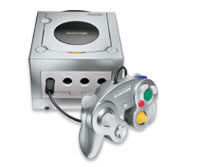 We’ve all known for a long time that TV as we knew-and-loathed-it was under pressure, as people discovered there were things more rewarding in their lives than passively sitting in a darkened room, being bathed in light from a box in the corner of the room, watching whatever the channel controller decided to ‘entertain’ them with.
We’ve all known for a long time that TV as we knew-and-loathed-it was under pressure, as people discovered there were things more rewarding in their lives than passively sitting in a darkened room, being bathed in light from a box in the corner of the room, watching whatever the channel controller decided to ‘entertain’ them with.
In a rather self-serving survey, “Digital Gaming in America”, Ziff Davis Media attempts to further fan the flames of this long lasting discussion, as they reveal that video gamers are watching less TV than they did previously, and will continue to reduce the amount they are consume.
Before you run to your boss, waving a printout of this story in your hand, proclaiming the near-death of TV. The results of the survey do reflect the general trend of what is happening, but do bear in mind the size of survey – 1,500 households (ie people who happened to be in, answered the phone, and had nothing better to do than answer a series of questions), compared with 295m people that live in America isn’t what you’d call statistically robust.
What did they find? About a quarter reduced their TV watching over the last year, with about a further fifth planning to do the same in the coming year. To put some hours against that, they estimate that there’s been a two hours per week drop over the last year to 16 hours a week this year, around a 10% drop.
The wolf isn’t quite at the door of TV. Looking at the hours/week, the reduced figure is still over 2.25 hours of TV a day, quite considerable when you consider what other task people do for that period of time, beyond working and sleeping.
 In 2003 the BBC did some far more interesting research in this area. Of course they found that numbers of hours watched dropped, but what we found significant was that those hours that were being spent in front of the TV, weren’t dedicated to watching it.
In 2003 the BBC did some far more interesting research in this area. Of course they found that numbers of hours watched dropped, but what we found significant was that those hours that were being spent in front of the TV, weren’t dedicated to watching it.
This was particularly true of the younger viewers (34 and under) who were doing other things – texting their friends, Web browsing, talking on the phone, playing games on portable games systems – while in front of the box. They would dip in and out of the TV programme as it was on, occasionally letting it grab their attention – treating it far more like radio. It doesn’t take a great deal of imagination to figure that their attention would be elsewhere during the advert breaks.
Where the Ziff Davis survey does become more interesting is looking at gaming on mobile phones, particularly as this report is US-centric and the market isn’t very mature. A surprising 42% of surveyed gamers had bought games for their phones, and that they’d spent an average of US$13 (~€10, ~£7) each over the last three months.
An additional surprise for us was the length of time the games had been played on the mobile phones – 19 minutes per gaming session. Given the size of the display and general difficulty of playing games on such restricted controls, this is a revelation.
The split of games played was Arcade (57%), Card (44%) and Puzzle (37%) – another suprise for us given the device’s restrictions mentioned in the paragraph above. We suspect that the dominance of arcade games will reduce as players realise thinking games will be more rewarding than twitching with little buttons.
Oh … by the way Ziff Davis just happen to publish the games magazine, Electronic Gaming Monthly, Computer Gaming World, Official U.S. PlayStation Magazine and 1UP.com – and their ad sales people are just sitting there waiting to hear from you if you want to shift your advertising budget from TV to their mags.
Ziff Davis Video Game Survey: Gamers Continue to Cut TV Viewing
BBC – TV’s Tipping Point: Why the digital revolution is only just beginning
 Almost a fifth of US consumers have admitted falling victim to identity theft, with younger adults at greatest risk, according to new figures.
Almost a fifth of US consumers have admitted falling victim to identity theft, with younger adults at greatest risk, according to new figures. Experian-Gallup found that around two-thirds of consumers who have yet to experience identity theft felt that it was unlikely to happen to them, with only six per cent taking the precaution of purchasing some form of identity theft protection.
Experian-Gallup found that around two-thirds of consumers who have yet to experience identity theft felt that it was unlikely to happen to them, with only six per cent taking the precaution of purchasing some form of identity theft protection. New US research claims that Americans are becoming increasingly “digital,” with over three quarters owning computers and many households verily humming with multiple digital electronics products, including cell phones to entertainment devices to cameras.
New US research claims that Americans are becoming increasingly “digital,” with over three quarters owning computers and many households verily humming with multiple digital electronics products, including cell phones to entertainment devices to cameras. The research was commissioned by hard drive manufacturer, Seagate, who were keen to remind users of their role in the digital revolution:
The research was commissioned by hard drive manufacturer, Seagate, who were keen to remind users of their role in the digital revolution: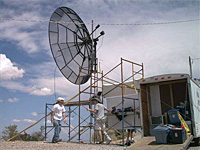 Those of you struggling to maintain a Wi-Fi connection from next door’s access point may be exclaiming a Victor Meldrew-style, “I don’t belieeeeve it!” at the news of a mighty new world record being set for an unamplified Wi-Fi link.
Those of you struggling to maintain a Wi-Fi connection from next door’s access point may be exclaiming a Victor Meldrew-style, “I don’t belieeeeve it!” at the news of a mighty new world record being set for an unamplified Wi-Fi link.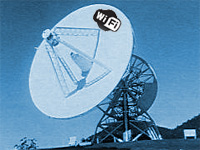 There is now talk of attempts to smash the current Bluetooth record of 1.08 miles.
There is now talk of attempts to smash the current Bluetooth record of 1.08 miles. Trying to work out the law surrounding this Wi-Fi malarkey seems to be a tricky business.
Trying to work out the law surrounding this Wi-Fi malarkey seems to be a tricky business.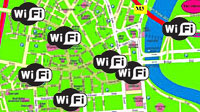 According to an article in the Financial Times, Microsoft says it has now built a database containing the whereabouts of “millions” of WiFi networks.
According to an article in the Financial Times, Microsoft says it has now built a database containing the whereabouts of “millions” of WiFi networks.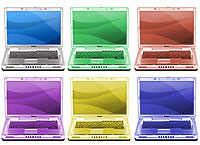 The doomsayers were predicting a slow year for PC shipments, but a continuing shift to notebooks and falling PC prices have made it a bumper second quarter for the worldwide PC market, according to research companies IDC and Gartner.
The doomsayers were predicting a slow year for PC shipments, but a continuing shift to notebooks and falling PC prices have made it a bumper second quarter for the worldwide PC market, according to research companies IDC and Gartner.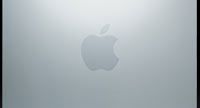 The company enjoyed big sales outside the US and remains the market share leader in many countries throughout Europe.
The company enjoyed big sales outside the US and remains the market share leader in many countries throughout Europe. Us in UK-land have long been fans of SMS messaging, with button-pushing Brits banging out 3 million text messages every hour, with 2.5 billions text being sent in January 2005 alone.
Us in UK-land have long been fans of SMS messaging, with button-pushing Brits banging out 3 million text messages every hour, with 2.5 billions text being sent in January 2005 alone.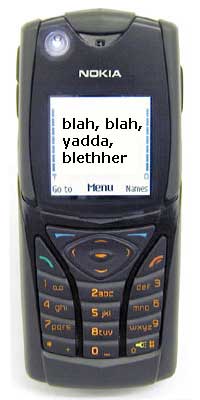 GSM operator T-Mobile was particularly chuffed with its performance as its customers belted out a total of 3.6 billion messages during Q1 2005 – that works out at around 67 texts per subscription per month.
GSM operator T-Mobile was particularly chuffed with its performance as its customers belted out a total of 3.6 billion messages during Q1 2005 – that works out at around 67 texts per subscription per month. palmOne transmogrifies into Palm, Inc today, following an announcement on May 24 that the company had acquired unencumbered rights to the Palm brand after buying out the share of the brand formerly controlled by PalmSource, Inc.
palmOne transmogrifies into Palm, Inc today, following an announcement on May 24 that the company had acquired unencumbered rights to the Palm brand after buying out the share of the brand formerly controlled by PalmSource, Inc. Palm have a bit of a history with faffing about with their name. palmOne was created in October 2003 when the earlier Palm, Inc. spun off PalmSource and acquired Handspring, Inc.
Palm have a bit of a history with faffing about with their name. palmOne was created in October 2003 when the earlier Palm, Inc. spun off PalmSource and acquired Handspring, Inc. US police have arrested a Florida man for gaining illegal access on a domestic wireless Internet network.
US police have arrested a Florida man for gaining illegal access on a domestic wireless Internet network.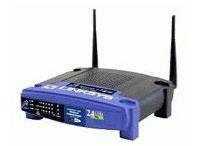 There’s not much harm in that, but the newspaper report points out the darker side of Wi-Fi pilfering, with criminals using the unsecured networks to traffic in child pornography, steal credit card information and even send death threats.
There’s not much harm in that, but the newspaper report points out the darker side of Wi-Fi pilfering, with criminals using the unsecured networks to traffic in child pornography, steal credit card information and even send death threats. In a pretty gung-ho move that shows a lot of seriousness, the US Department of Justice (DoJ) have announced the results of Operation Site Down. More than 20 raids occurred in Australia, Belgium, Canada, Denmark, France, Germany, Israel, the Netherlands, Portugal and the UK, as well as 70 in the USA.
In a pretty gung-ho move that shows a lot of seriousness, the US Department of Justice (DoJ) have announced the results of Operation Site Down. More than 20 raids occurred in Australia, Belgium, Canada, Denmark, France, Germany, Israel, the Netherlands, Portugal and the UK, as well as 70 in the USA.